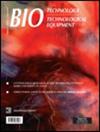微卫星不稳定结直肠癌与CD1a-和cd83阳性树突状细胞浸润增加有关
IF 1.4
4区 生物学
Q4 BIOTECHNOLOGY & APPLIED MICROBIOLOGY
引用次数: 0
摘要
微卫星不稳定性(MSI)的特点是高度免疫原性的肿瘤表型和丰富的淋巴细胞浸润。本研究的目的是研究258名结直肠癌(CRC)患者的四种免疫组织化学测定的树突状细胞(DC)与微卫星不稳定状态之间的关系,并探讨这些细胞作为生存预后因素的可能作用。我们观察到dc在肿瘤间质(TS)和浸润前缘(IF)中有明显的浸润模式,其中dc在浸润前缘明显占优(p < 0.0001)。MSI肿瘤活检显示,与微卫星稳定的crc相比,TS和IF中CD1a +和CD83+ dc的浸润明显更高。生存分析显示,TS和IF患者的CD1a +和CD83+ DC数越高,手术后患者的生存时间越长(p < 0.05, Log rank检验)。Cox多因素分析显示,TS中CD1a + DCs的低浸润(p = 0.039)和IF中CD83+ DCs的低浸润(p = 0.022)是CRC患者预后不良的独立预后因素。我们的研究结果表明,免疫组织化学测定的CD1a +和CD83+ dc可以作为微卫星不稳定性的特征,并可以进一步探索作为患者预后的预后指标。本文章由计算机程序翻译,如有差异,请以英文原文为准。
Microsatellite unstable colorectal cancers are associated with increased CD1a- and CD83-positive dendritic cell infiltration
Microsatellite instability (MSI) is characterized by a highly immunogenic tumor phenotype and abundant lymphocytic infiltrates. The aim of this study was to investigate the association between four immunohistochemically determined classes of dendritic cells (DC) with microsatellite instability status of 258 colorectal cancer (CRC) patients and to explore the possible role of those cells as prognostic factors for survival. We observed a distinct infiltration pattern of DCs both in tumor stroma (TS) and invasive front (IF), with DCs significantly prevailing in the IF (p < 0.0001). MSI cancer biopsies showed significantly higher infiltration of CD1a + and CD83+ DCs in the TS and IF compared to microsatellite stable CRCs. Survival analysis revealed that higher CD1a + and CD83+ DC numbers both in TS and IF correlated with longer survival of the patients after surgical therapy (p < 0.05, Log rank test). Cox multivariate analysis showed that lower infiltration with CD1a + DCs in TS (p = 0.039) and CD83+ DCs in IF (p = 0.022) was an independent prognostic factor for unfavorable outcome for CRC patients. The results of our study suggest that the immunohistochemically determined CD1a + and CD83+ DCs could be used as a feature of microsatellite instability and could be further explored as prognostic markers for patients’ outcome.
求助全文
通过发布文献求助,成功后即可免费获取论文全文。
去求助
来源期刊

Biotechnology & Biotechnological Equipment
工程技术-生物工程与应用微生物
CiteScore
3.10
自引率
0.00%
发文量
90
审稿时长
1 months
期刊介绍:
Biotechnology & Biotechnological Equipment (B&BE) is an international open access journal publishing cutting-edge research. A modern world requires modern biotechnology and nanobiology. The journal is a forum that provides society with valuable information for a healthy and better life and promotes “the Science and Culture of Nature”.
The journal publishes original research and reviews with a multidisciplinary perspective; expanded case reports with a focus on molecular medical research and advanced practice in evidence-based medicine are also considered.
 求助内容:
求助内容: 应助结果提醒方式:
应助结果提醒方式:


